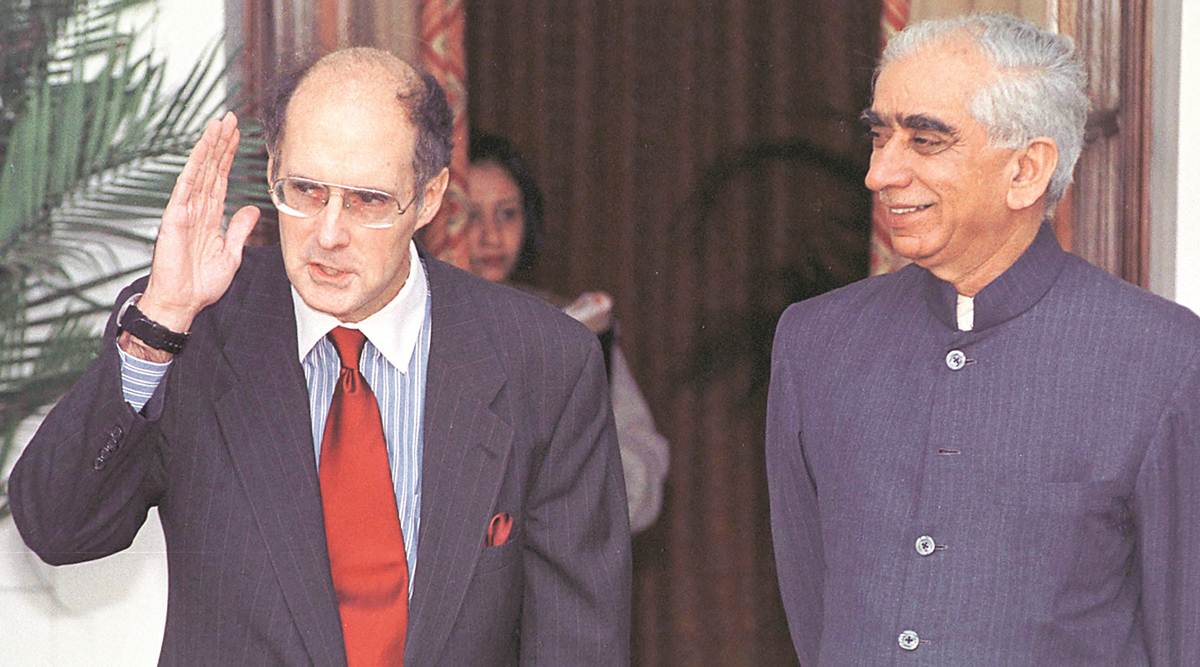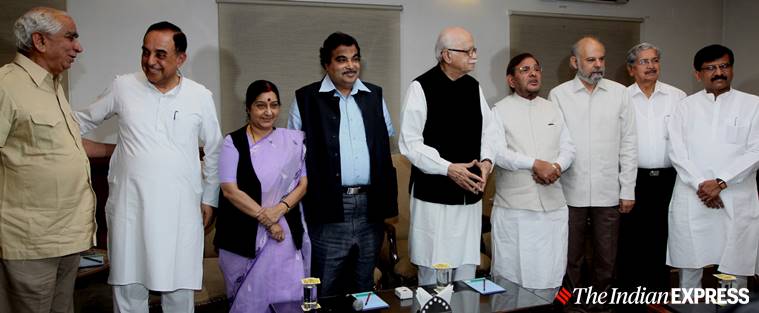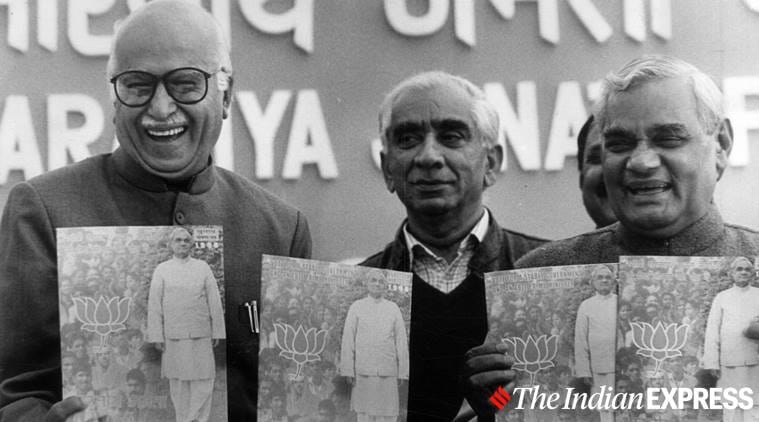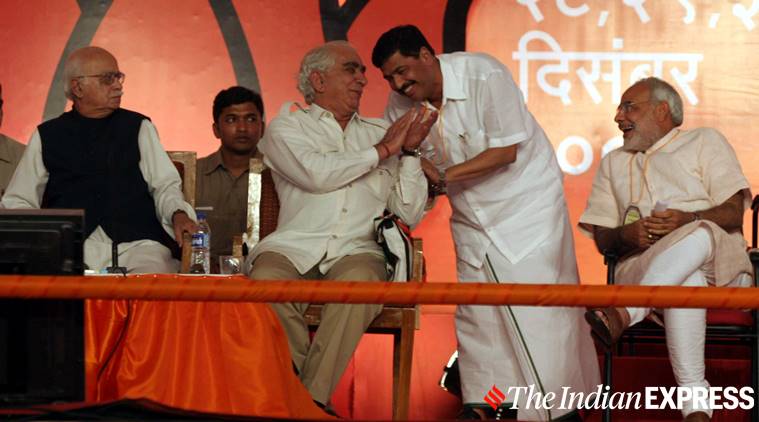 Jaswant Singh with then US Deputy Secretary of State Strobe Talbott. (File)
Jaswant Singh with then US Deputy Secretary of State Strobe Talbott. (File)On a winter evening of December 1999, I had the first encounter with the then External Affairs Minister Jaswant Singh. As a city reporter, I managed to get inside a private meeting between Singh and the relatives of the hijacked passengers of the IC-814 plane.
As one of the passengers made an impassioned plea, “Sir, please do something for the sake of our children”, Singh told them, “If by keeping my son as the hostage, I could release those passengers, I am willing to offer my son.”
What I did not know back then was that he had even discussed this with his son, a fact Singh recorded in one of his books.
That Singh’s long and eventful career as India’s Minister for External Affairs, Defence and Finance is remembered for this Kandahar hijack episode, which culminated with his accompanying the three terrorists, including Masood Azhar, is something that rankled him.
In his book, “A Call to Honour: In service of emergent India”, he reproduced his diary jotting on December 31, 1999 on board the special flight to Kandahar with the three terrorists, “I do not really know what to term my mission — a rescue mission, an appeasement exercise, a flight to compromise or a flight to the future?”
 (L to R) Jaswant Singh, Subramanyam Swami, Sushmaa Swaraj, Nitin Gadkari, L K Advani, and Sharad Yadav, Naresh Gujral and Sanjay Raut (extreme right) during the NDA meeting at BJP leader LK Advani’s residence in 2012 (Express archive)
(L to R) Jaswant Singh, Subramanyam Swami, Sushmaa Swaraj, Nitin Gadkari, L K Advani, and Sharad Yadav, Naresh Gujral and Sanjay Raut (extreme right) during the NDA meeting at BJP leader LK Advani’s residence in 2012 (Express archive)
In the book, Singh recalled it as a “searing experience” as he battled between “two moral rights: saving the lives of innocents and a fight against terrorism”.
Later, in an Idea Exchange at The Indian Express in 2012, Singh rationalised the decision, “Governments have to take decision not as if they are white or black… it’s not decisions have often to be taken, most often to be taken, when the choice is between shades of grey, between bad and less bad. And in this case, to release three in-prison terrorists, is in-principle bad. To know that your action-inaction would result in the deaths of 166 innocent people is very bad. No government can possibly let a 166, some of them are not even your citizens, die…if I were to make a choice I would unhesitatingly make a choice for the life of human beings.”
Jaswant Singh, who served as External Affairs Minister from December 5, 1998 to July 1, 2002, was key to India’s foreign and strategic policy at the turn of the century. He shaped India’s engagement with the world at a critical juncture.
In the aftermath of India’s nuclear tests in 1998, he was deputed by Prime Minister Atal Bihari Vajpayee to act as India’s representative to hold conversations with the US. He had several conversations with American interlocutor Strobe Talbott on matters related to nuclear policy and strategy.
 BJP President LK Advani, Jaswant Singh, and Former Prime Minister Atal Behari Vajpayee releasing party manifesto at Party Head office (Express archive photo by Ravi Batra)
BJP President LK Advani, Jaswant Singh, and Former Prime Minister Atal Behari Vajpayee releasing party manifesto at Party Head office (Express archive photo by Ravi Batra)
Singh is widely regarded for his handling of relations with the US that were strained after the May 1998 nuclear tests but improved soon after, paving the way for the 2000 visit of US President Bill Clinton to India.
Talbott, in his book Engaging India wrote that he and Singh met 14 tims at 10 locations in seven countries on three continents.
In July ‘98, US Secretary of State Madeleine Albright met Singh on the sidelines of the ASEAN Regional Forum meeting. Albright started the meeting, according to Singh in his book, “You have betrayed us, Jaswant. You gave us false assurances…” To which, Jaswant said, with a smile, “No Madeleine, far from it. Your agencies betrayed you…”
The outcome of these negotiations have been the bedrock of the Indo-US ties in the 21st century.
 LK Advani, Pramod Mahajan, Jaswant Singh and Narendra Modi in Mumbai in 2005 (Express archive)
LK Advani, Pramod Mahajan, Jaswant Singh and Narendra Modi in Mumbai in 2005 (Express archive)
He was also the External Affairs Minister when the Kargil conflict took place in 1999. He was the key interlocutor with Pakistan’s civilian government as well as the US administration, and worked towards building international consensus in portraying Pakistan as the aggressor in the conflict.
One of the abiding memories among Indian diplomats is Singh’s finesse when he read the riot act in June 1999 when Pakistan Foreign minister Sartaj Aziz visited Delhi.
T C A Raghavan, who worked as Singh’s aide and later went on to become the Indian High Commissioner to Pakistan wrote in his book, “The People Next Door: The curious history of India’s relations with Pakistan”: “Singh, a former cavalry officer who carried his military bearing wherever he went, was in no mood for a long discussion.” Jaswant Singh later told his colleagues, according to Raghavan, “Aziz’s proposal to have a ceasefire…so totally irrelevant that I could hardly hide my impatience.”
Singh’s erudition, diplomacy and generosity is widely known.
On Sunday, after hearing of his demise, current Indian ambassador to Madagascar and Comoros, Abhay Kumar recalled an incident. Just after joining the Indian Foreign Service, he would often visit Khan Market in Delhi. “Once we saw Jaswant Singh strolling and told him that we were IFS probationers of the 2003 batch. He took us to a bookshop and bought us all books.”
That was quintessential Jaswant Singh.
📣 The Indian Express is now on Telegram. Click here to join our channel (@indianexpress) and stay updated with the latest headlines
For all the latest India News, download Indian Express App.